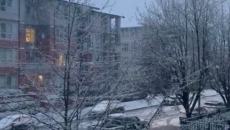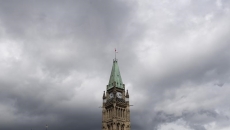OTTAWA - Health Canada authorized the first at-home, oral treatment for COVID-19 Monday. But what is Paxlovid, how does it work and who can get it? Here are some answers.
Q: What is Paxlovid?
A: Pronounced PAX-luh-vid, it is an oral antiviral treatment for COVID-19, consisting of a combination of two medications that must be taken together. The first drug, nirmatrelvir, blocks an enzyme that the SARS-CoV-2 virus needs to reproduce. The second, ritonavir, is a commonly used HIV treatment, which in the Paxlovid combination, slows down how fast nirmatrelvir breaks down so it can do its job for longer.
In clinical trials, Paxlovid was so successful at reducing hospitalizations and deaths among high-risk people not yet seriously ill with COVID-19 that Pfizer ended the trial early so it could start giving the treatment to a wider number of people. When given within three to five days of symptoms, it was 85 to 89 per cent effective at reducing hospitalizations. No Paxlovid patients died, while seven people in the study died after receiving a placebo.
Q: Will this help end the pandemic?
A: McMaster University infectious disease specialist Dr. Zain Chagla says it's not a silver bullet but if it gets to the people at highest risk of getting seriously ill from COVID-19, it can help reduce pressure on hospitals.
Q: How is Paxlovid taken?
A: A course of treatment requires two oral tablets of nirmatrelvir, and one of ritonavir, taken together, twice daily, for five days. it must be prescribed by a doctor, and treatment must continue for the full five days even if symptoms improve or disappear. Pfizer says the pills are to be swallowed whole, with water, and not crushed or dissolved before taking.
Q: Who can get it?
A: Health Canada's authorization is for adults who are considered to be high risk for serious illness from COVID-19, but who are experiencing only mild or moderate symptoms and are within five days of being infected.
But with limited supplies at least at first, the Public Health Agency of Canada is asking provinces to be careful and targeted with the treatment. People with compromised immune systems, such as transplant recipients and cancer patients, are to be at the top of the list, because even with vaccinations, their immune systems are not good at fending off the virus.
PHAC is suggesting that unvaccinated people over 80, and unvaccinated people over 60 who live in long-term care, rural or remote places or First Nations should be next in line, following the science on who is at the highest risk for serious illness and death.
Q: The provinces and territories get the final say about who will get it. Are they following the PHAC guidelines?
A: So far yes, but many provinces have yet to finalize their plan for its use. Only 30,400 courses of the treatment will be made available this month, and another 120,000 in February and March.
Quebec, Ontario and Saskatchewan all say they will focus first on immune-compromised patients alone, before potentially expanding to others as supplies increase. Most other provinces are still working out their plan.
Q: Where and how can I get it?
A: This may vary by province. Ontario intends to make it available at 15 hospital sites, while Alberta will ship their supply to a small number of community pharmacies.
Danielle Paes, the chief pharmacist officer at the Canadian Pharmacists Association, said the organization is in talks with provincial and federal health officials to help with the rollout.
Paes said because there is a very short window for people to get tested, receive results and obtain a prescription, a pharmacy may be able to play a big role. She said there are discussions about whether pharmacists should get emergency prescribing authority, so if a qualifying patient tests positive at their pharmacy they can immediately prescribe and dispense Paxlovid to them.
Dr. Satchan Takaya, infectious disease specialist with the Saskatchewan Health Authority, said Tuesday patients who think they qualify and want the treatment are likely going to be asked to call a provincial hotline to seek it out.
Quebec wants to have a list of potential patients ahead of time. Dominic Bélanger, the interim director of pharmaceutical and medical affairs at the Quebec Health Department, said oncology clinics and other facilities will be asked to help identify people who may qualify if they are infected.
Q: How much does it cost?
A: The federal government is shouldering the cost for the moment so patients should not be charged any fees to get Paxlovid.
Q: If there is a good treatment, should I still get vaccinated?
A: All the experts consulted by The Canadian Press said absolutely yes. Paxlovid is not a substitute for vaccination. "Most people won't need it," Takaya said. "Most people are well-protected with their vaccination. Being fully vaccinated prevents that progression to severe disease."






